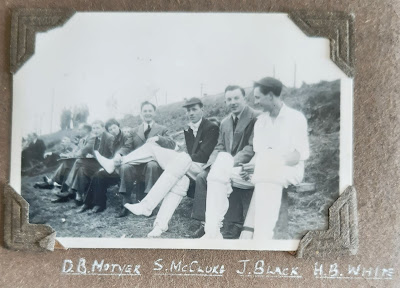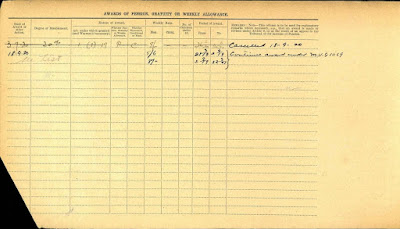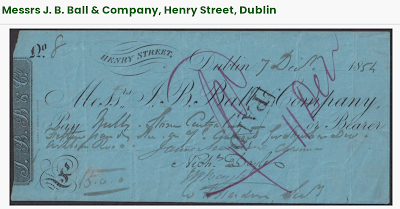Lieutenant Andrew Young Sloane
Sloane was born in Rosslea, Co. Fermanagh on 18th January 1894 to John Moorhead Sloane, National School Teacher & Farmer and Eliza Anne Sloane nee Moorehead (of Smithborough, Co. Monaghan). The bank Staff Record card records his date of birth as 18th March 1894. His parents had married on 4th April 1893 at Stonebridge Presbyterian Church, Clones.
A brother, John Moorehead Sloane was born on 4th February 1895. He died on 19th November 1896 aged 21 months.
In 1901, Sloane (7) lived in house, 9, Rosslea Village, Rosslea, Co. Fermanagh with his parents and 3 siblings; Thomas W (4), Anna E (2) and Maggie H (2). Two servants are also living in the property; Mary Duffy and Annie Hamilton.
A sister, Ethel Matilda Sloane was born on 22nd August 1903. She died on 16th March 1911 aged 7 years and 7 months.
A brother, Robert James Sloane was born on 1st March 1905. He died on 13th December 1905 aged 6 months.
By 1911, the family property was known as house 48, Rosslea Town, Rosslea, Co. Fermanagh. Sloane is living with his parents and younger sister, Maggie H (10). Two servants are also living in the property; Mary Anne Mullan and Katie Casey. Annie and Thomas are residing in the Fever Hospital at
house 1.2 in Clonboy (Clones Rural, Monaghan). 2 further siblings are in the hospital; Jack John Sloane (9) and Rebecca Sloane (4). All are being treated for diphtheria and whooping cough.
His father, John M Sloane died on 13th May 1911.
Sloane joined Northern Bank at Head Office on 14th March 1913. Transfers followed to Kilrea (1913 - Junior) and Ballynahinch (1913 - Junior).
Northern Bank, Head Office, Victoria Street, Belfast
Northern Bank, Kilrea branch
Northern Bank, Ballynahinch branch
On 1st December 1914, whilst in Ballynahinch branch, he volunteered and enlisted into the Army Ordnance Corps (AOC) as a Private aged 19. His Service Number was 02852.
A Y Sloane - Medal Index Card
His first theatre of war is recorded as France from 10th February 1915. He later transferred to the Canadian Artillery, was promoted to Sergeant, and then Gazetted as a 2nd Lieutenant in the Royal Garrison Artillery. Further promotion to Lieutenant followed.
Sloane saw service in Ypres 1915, Festubert 1915, Somme 1916, Messines 1917, Cambrai 1917 and the Allied Retreat 1918. He was injured 4 times; gassed, gunshot wound, a further gunshot wound and another gassing.
Demobilisation came in February 1919. He was awarded the 1915 Star, the British Victory Medal and the British War Medal.
A Y Sloane - Medal Roll
A Y Sloane - Pension Index Card (as a result of his injuries)
Following demobilisation, Sloane re-joined the Northern Bank on 23rd April 1919 at Head Office. Transfers followed to Lisburn (1919 - Junior), Boyle (1920 - Cashier), Head Office (1922), Ball’s Branch (1924 - Accountant), Head Office (1924), Shaftesbury Square (1925 - Paying Teller), Ballynahinch (1931), Limavady (1931 - Cashier), Newry (1940 - Sub Manager) and Keady (1943 - Manager), Larne (1949 - Manager).
He enjoyed golf and was an office-bearer at Spa Golf Club, Ballynahinch. Whilst in Larne, he was a member of the charity, British Sailors' Society.
Northern Bank, Lisburn branch
Cheque drawn on Ball & Company

Northern Bank, Shaftesbury Square branch
Northern Bank, Newry branch
Northern Bank, Keady
Northern Bank, Larne branch
Sloane retired from the bank on pension on 31st March 1958. He later moved to South Africa where he died on 15th March 1984. He is buried at Clogh Church of Ireland Graveyard, Rosslea, Co. Fermanagh.
A Y Sloane - Headstone
A Y Sloane - Probate






























































